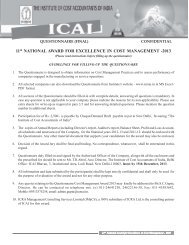This Issue - Icwai
This Issue - Icwai
This Issue - Icwai
You also want an ePaper? Increase the reach of your titles
YUMPU automatically turns print PDFs into web optimized ePapers that Google loves.
is known as “Income after Undistributed Operating<br />
Expenses” (vide Ninth Edition of USALI).<br />
(c) Finally, at the third part of the income<br />
statement, fixed charges such as rent, taxes, insurance,<br />
interest, depreciation and amortization charges are<br />
deducted in order to arrive at “Income before Incometaxes”.<br />
As usual, the net income is the amount<br />
available after income tax obligations.<br />
It may be mentioned here that, in most cases,<br />
undistributed operating expenses, combined with<br />
management fees, rent, property taxes, and insurance<br />
comprise the major portion of total expenses for the<br />
period. It is further pointed that hotels have a high<br />
proportion of fixed costs and that about three-quarters<br />
of the total costs are fixed and uncontrollable (Kotas,<br />
1982, 1997)<br />
Exhibit # 1 : USALI Operating Income Statement<br />
Revenue<br />
Rooms X<br />
Food and Beverage X<br />
Other Operating Departments X<br />
Rentals and other Income X<br />
Total Revenue (A) XX<br />
Departmental Expenses<br />
COVER COVER ARTICLE<br />
ARTICLE<br />
Rooms (X)<br />
Food and Beverage (X)<br />
Other Operating Departments (X)<br />
Total Departmental Expenses (B) (XX)<br />
Total Departmental Income (A – B = C) X<br />
Undistributed Operating Expenses<br />
Administrative and General (X)<br />
Sales and Marketing (X)<br />
Property Operations and Maintenance (X)<br />
Utilities (X)<br />
Total Undistributed Expenses (D) (XX)<br />
Gross Operating Profit (C – D = E) X<br />
Managemnt Fees (F) (X)<br />
Income before Fixed Charges (E – F = G) X<br />
Fixed Charges<br />
Rent (X)<br />
Property and Other Taxes (X)<br />
Insurance (X)<br />
Total Fixed Charges (H) (XX)<br />
Net Operating Income ( G – H = I)<br />
Less : Replacement Reserve (J) (X)<br />
Adjusted Net Operating Income (I – J = K) XXX<br />
Source : USALI 10th Revised Edition, 2006<br />
USALI and GAAP<br />
There is no reason to believe that USALI is a<br />
universally accepted method of accounting for the<br />
hospitality industry. There are many countries where<br />
USALI is not followed or the published Annual Reports<br />
does not contain reference to the USALI, e.g. the Annual<br />
Reports of the Taj Hotel Groups. One particular reason<br />
for not following USALI in India is that, under the<br />
Indian Companies Act, 1956, the form and content of<br />
the Income Statement and the Balance Sheet are rather<br />
prescriptive and sector neutral. However, the strength<br />
of USALI lies in the fact that the income statement<br />
prepared under this method is highly adaptable to the<br />
accounting requirements under the GAAP and<br />
Companies Act. Indeed, the purpose of USALI is not<br />
to replace but to supplement GAAP. Besides, as a result<br />
of continuous updating of USALI, it is now more<br />
aligned to the GAAP than ever.<br />
Some changes made in the 9th and 10th Editions<br />
of USALI leading to greater convergence with GAAP<br />
are as below :<br />
(a) Preopening expenses : Preopening expenses<br />
include expenditures for intangible costs incurred<br />
prior to the opening of a hotel property that will<br />
benefit the property in future years. Examples include<br />
the grand-opening party, advertising, and training.<br />
Historically, those expenditures have been recorded<br />
as preopening expenses and reported as an “other<br />
asset” on the balance sheet. Those costs were then<br />
amortized over an intermediate period, such as three<br />
to five years. But to align it with the International<br />
Accounting Standards/national GAAP, those<br />
expenditures cannot be recognized as assets; they are<br />
now required to be recorded as expenses immediately.<br />
(b) China and glassware : In the past the uniform<br />
system recommended that those items be recorded<br />
as “property and equipment” and be written off over<br />
their useful life. Now, these items are required to be<br />
expensed when placed into use.<br />
The Management Accountant |September 2011 753




